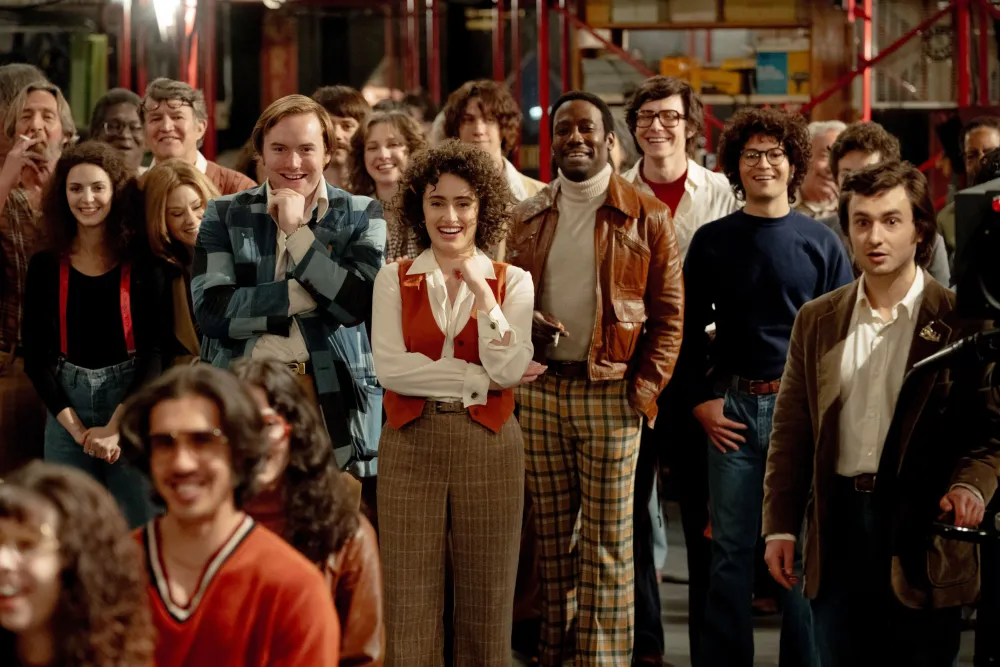Review | ‘Saturday Night’ overwhelms and excites


Courtesy of Sony Pictures
A stage light soars to the ground and bursts into flames. Two comedians flay insults at one another before lunging into a brawl. Illicit drugs are passed from person to person. To make matters worse, the show goes on in 90 minutes.
This is a mere snippet of the chaos that ensued before the first live episode of NBC’s sketch-comedy program Saturday Night Live, as presented in “Saturday Night,” a film that retells the trial and error — and there were lots of errors — of the show’s first night on Oct. 11, 1975.
Of course, this is dramatized greatly by screenwriters Gil Kenan and Jason Reitman. Reitman, whose credits include the 2005 coming-of-age film “Juno” and the more recent “Ghostbusters: Afterlife,” doubles as the film’s director.
SNL is no stranger to comedic criticism in recent years. Critics claim that the show is at its best cliched, helmed by an older generation trying — and failing — to appeal to a younger audience. At its worst, Saturday Night Live is sterile and inorganic, failing to channel the DIY spirit that it once had. Yet “Saturday Night” illustrates that the hitmaking show was once the underdog of NBC, nearly not making it to air. With its ’70s charm, it’s the type of film that makes viewers lament being born in the wrong generation.
The movie is generally fast-paced, using tracking shots to follow a young Lorne Michaels — Gabriel LaBelle — down long hallways amidst the mayhem of props, costumes, makeup and rehearsals surrounding him. Yet there are some slower, sweeter moments appropriately dispersed throughout the run time, mostly involving Lorne and his ex-wife, Rosie Shuster — Rachel Sennott — towards the start of the film, they sit in the control room, rewatching dress rehearsals, sharing sweet smiles despite their recent separation. These sentimental moments veer into corny territory, but the film never loses its warmth and somehow avoids feeling calculated.
While the plot itself is fairly scattered and follows multiple people simultaneously, the story always centers back to Lorne struggling to get a quality show to air despite the unpreparedness of his cast and crew. The stakes rise when David Tebet — Willem Dafoe — a network executive, and other NBC shareholders gather to watch what they consider to already be a failure. As Lorne strives for a successful night that is always just out of his reach, the audience feels his desperation.
While the large ensemble cast works as a team to take Saturday Night Live’s community-oriented roots to screen, each cast member shines as an individual. LaBelle is more than capable as the film’s lead, a disorganized but passionate Lorne Michaels struggling to crack orders through a feeble, nearly prepubescent voice. As the quick-witted Rosie, Sennott continues to prove herself as a multi-faceted actress — she’s distinct, despite her character existing mostly in the context of the men of SNL, balancing her roles as Lorne’s ex-wife and a current fling of Dan Aykroyd, played by Dylan O’Brien.
There are other standout performances — Nicholas Braun shines in his double-casting of the quirky Andy Kaufman and Jim Henson, and Cory Michael Smith captures the egotistical nature of a young Chevy Chase. But if I were to describe all the phenomenal performances within “Saturday Night,” we’d be here all day. Other notable members include J.K. Simmons, Willem Dafoe, Lamorne Morris, Ella Wood and Andrew Barth Feldman, among many others.
Don’t expect “Saturday Night” to provide any explanation as to who these people are. Prior to my viewing, I was only familiar with Lorne Michaels and Chevy Chase. To get maximum enjoyment out of the film, you should do some light research on Saturday Night Live’s original cast before your viewing.
While younger audiences will be drawn to the cast’s rising stars like Finn Wolfhard and Kaia Gerber, along with the absurdness of the story itself, “Saturday Night”’s true target audience is the boomers who witnessed the birth of its source material — I can say for certain that I was the youngest one in my theater. The pop culture references are half of its charm, constantly depicting the behind-the-scenes drama that surrounded the show’s conception — a highlight being that Rosie Shuster, after separating from Lorne Michaels, began a relationship with Dan Aykroyd, who was formerly with Gilda Radner — Ella Hunt — and had an occasional fling with Laraine Newman — Emily Fairn. If you have absolutely no familiarity with New York’s comedy scene in the mid-70s, prepare to be lost in a sea of names and faces.
“Saturday Night” is worth seeing, even if you aren’t a die-hard SNL fan. The cast is made up of lovable characters, and the messiness of their personal lives combined with the portrayal of the production process makes for an entertaining, feel-good watch.
Recent Posts
First Place | The summer apartment
See two girls: one 19, the other 20. They’re both engineering students far from home,…
Second Place | Moist and buttery gluten-free coffee cake
This gluten-free coffee cake is so indulgent you would never even know it was free…
Third Place | Dinner rush
Runner, please. Hands. Behind. 86 zucchini. Heard. There’s a slight ringing in my ears, and…
Runner-Up | Let me tell you about hobbies and death
Well, everyone has to have a hobby. Mom says you gotta love something or else…
Runner-Up | Artemis
In her dream, the moon exploded. Something hit it from behind — some dark shadow,…
Runner-Up | Setting the scene
My father and I are running through the forest. Our footsteps pound with silent desperation…

